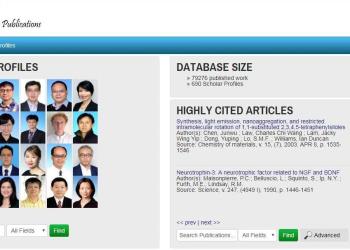News & Stories
2018
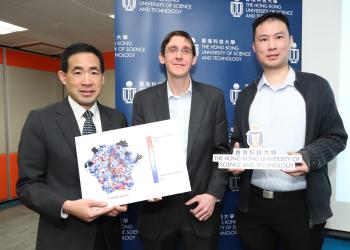
News
HKUST Researchers Discover Fitness Landscape of HIV Envelope Protein That May Help Vaccine Development
An international multi-disciplinary research team led by scientists at the Hong Kong University of Science and Technology (HKUST) has discovered for the first time a computational framework that could map out the fitness landscape of a crucial protein in the human immunodeficiency virus (HIV), potentially paving the way for rational design of a vaccine that may force the deadly virus to mutate into forms that lead to its demise.
Despite significant advances in medicine, an effective vaccine for HIV is still not available, although recent hope has emerged through the discovery of antibodies capable of neutralizing diverse HIV. The virus, however, can still evade known broadly neutralizing antibody responses via mutational pathways, which makes it all the more difficult to design an effective solution.
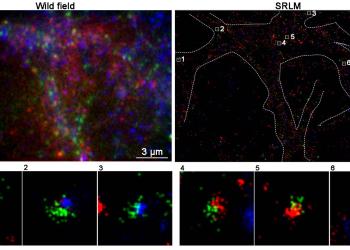
News
HKUST Scientists Reveal How Human Brains Keep Balance
An interdisciplinary team of scientists from The Hong Kong University of Science and Technology (HKUST) has discovered the mechanism of how human brains turn on and off neuronal activities, providing an important foundation to understand a wide range of neurologic conditions such as epilepsy, Parkinson's disease and ataxia-telangiectasia diseases.
“As with all things in life, healthy brain function depends on a balance of neuronal activities. We think of our brains as active - moving a leg and saying a word are all "active" events, but it is just as important that our brains be able to stop these actions,” said Cheng Aifang, a postgraduate student from the Division of Life Science who made the discovery under the guidance of the division’s head and Chair Professor Karl Herrup. “Yet it was not clear how our brains actually perform this go/stop function until now.”
2017
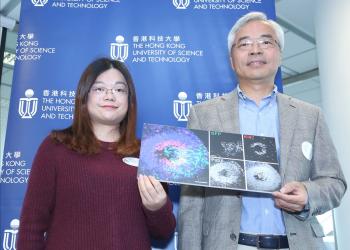
News
Awards-winning HKUST Neuroscientist Discovers Mechanism of Schizophrenia
A research team led by awards-winning neuroscientist and structural biologist Prof Zhang Mingjie of the Hong Kong University of Science and Technology (HKUST) has recently reached a breakthrough unveiling the fundamental mechanism that causes schizophrenia and other serious psychiatric conditions. Such discovery may potentially lead to the development of new treatments and drugs for the mental disorders. At present, there are about 40,000 diagnosed schizophrenic patients in Hong Kong [1].

News
An Updated Library Catalog The New PowerSearch
PowerSearch got a new look and new functions this summer. Not only at HKUST, but at all 8 UGC-funded university libraries (known as JULAC) as well. We have all moved onto one single online platform for you to find, access, retrieve, and request resources from the 8 UGC libraries. The aggregate collection of materials from all JULAC Libraries is known as HKALL.
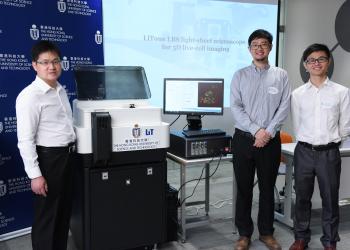
News
HKUST Discovers New Technology to Capture Live Cell Images Opening New Possibilities to the Study of Cell Biology
Researchers at The Hong Kong University of Science and Technology (HKUST) have developed a new generation of microscope, which not only could capture 3D live cell videos, but the resulted images are also of much higher quality, greatly enhancing the accuracy and the scope of research on cell biology.
While an existing confocal microscope can also capture 3D bio-images, the laser light hitting on the sample is typically one million times that of summer sunlight, such intense light exposure inevitably disrupts cell activities and eventually kills the cell, posing limits to the study of cell biology.
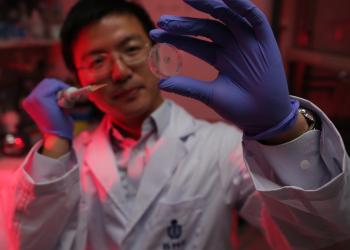
News
HKUST Develops New Stimuli Responsive Smart Hydrogels That Open Doors for Future Material Biology and Biomedical Applications
A research team led by Prof SUN Fei, Assistant Professor of Chemical & Biological Engineering at The Hong Kong University of Science and Technology (HKUST), has created a new protein-based stimuli-responsive smart hydrogel that could open doors for future material biology and biomedical applications.
Hydrogels, also known as soft matter in the medical world, are leading materials for biomedical applications such as drug delivery and stem cell therapy. But traditional hydrogels, used in products such as facial masks and contact lenses, are made up of either synthetic polymers or biological extracts such as animal collagen, are likely to cause allergies. They cannot fully mimic the complex biological environment needed for cell growth and development.
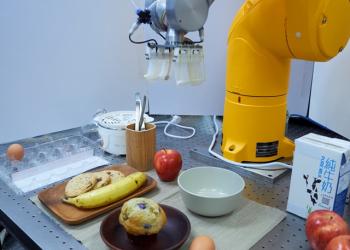
News
Turning a Joke into an Award-winning Innovation
If you’ve ever struggled with trying to pick up tofu with chopsticks, think how difficult it must be for the steely grip of a mechanical robot. But thanks to some great teamwork and a lot of persistence, that’s exactly the challenge recently solved by five Mechanical Engineering students at HKUST, an achievement that has won them the 2017 President’s Cup for excellence in research and innovation.
The team’s ‘Smart Soft-End Effector’ is a flexible robotic gripper that can safely handle the most delicate items, offering strong potential for commercial development. The idea was initiated in 2015 by Alex Tse Yu, a final year engineering student, who has long been interested in soft robotics and created a prototype.







